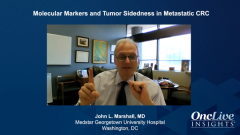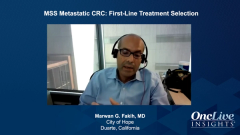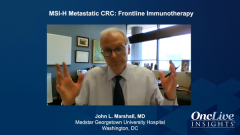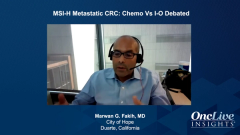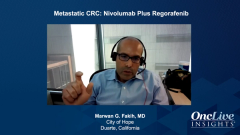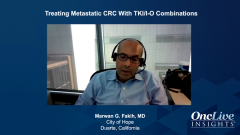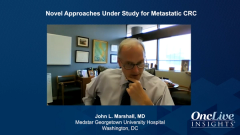
Molecular Markers and Tumor Sidedness in Metastatic CRC
Metastatic colorectal cancer (CRC) experts discuss tumor sidedness and their current use of next-generation sequencing panels to assess patients and guide treatment decisions.
Episodes in this series

John L. Marshall, MD: Marwan, Joleen brings up molecular testing. What is our current standard? When testing a patient with metastatic colorectal cancer, what do you have to have tested in every patient?
Marwan G. Fakih, MD: We've all moved to NGS [next-generation sequencing] platforms, John, and I really think that's the way to do it. The musts to test for are KRAS, NRAS, BRAF, MSI [microsatellite instability]-high status, and HER2 amplification, which can be done initially by IHC [immunohistochemistry] if needed. One can also argue that tumor mutation burden as well as fusions should be looked at. Of course, those become really rare. Fragmenting the testing really doesn't do the patient service here. You don't want to be doing a panel of 5, 6 markers, and IHC, and then exhaust your biopsy, and then say, “Oh, I didn't look for fusions. I didn't look for NTRK. I didn't look for RET fusions.” And so, I think every single patient with stage IV disease deserves to have their tumor evaluated by next-generation sequencing using a certified assay.
John L. Marshall, MD: Yeah. I’m thinking about this patient who I was prepping the chart for. There's 1 core biopsy from an intraoperative biopsy, right? So they could have gotten a piece of tissue, but they got 1 single core biopsy that's already been done for IHC, for MSI. And I'm like, “Is there going to be enough for the NGS?” Because we're doing the same thing you're doing. We're doing a broader reach, getting all of those things as quickly as we can get them to make frontline decisions.
Joleen, in regard to molecular testing, are you seeing differences between younger and older patients? Is there anything here that we can point to yet?
Joleen M. Hubbard, MD: Well, I think the biggest thing is older adults are more likely to have the methylation changes that lead to microsatellite instability. You'll see an increased frequency of deficient mismatch repair in patients as they get older. Those are often associated with a BRAF mutation as well. So I think those are the main molecular markers that are different between the younger and the older patients. Otherwise, they don't know that there's a big difference in KRAS mutations across different age groups; but, definitely MSI-high.
John L. Marshall, MD: You design a lot of trials. Are you stratifying or analyzing every clinical trial based on right- versus left-sided tumor location? Or, only when it involves any EGFR therapy? What are your thoughts?
Joleen M. Hubbard, MD: Traditionally, the left side of the colon did better, so I do think it is wise to stratify right versus left. Most of the patients with left-sided tumors will have the opportunity for EGFR inhibitor treatment, which just gives them another line of therapy. So I think it is good to stratify between the right and left side, definitely.
John L. Marshall, MD: Marwan, what do you think?
Marwan G. Fakih, MD: I agree if it's a phase 3 trial and the primary endpoint is overall survival or PFS [progression-free survival]. But for phase II trials, for example, where you're looking at a new mechanism of activity, or if you're looking at immunotherapy, for example, I'm not sure there is a need to stratify based on tumor sidedness at this point. I think we need to look at it in terms of data, and collect that information.
As you know, John, stratification is limited. For smaller studies, you've got to prioritize which have the highest impact. But I would say in the context of larger phase 3 trials, sure.
John L. Marshall, MD: I'll just say that I think we've made a mistake over the past 15 years. We should have been doing this. Now it's too late. For many cases we can't really go back to do this. But, we're trying. We keep looking.
Transcript Edited for Clarity


